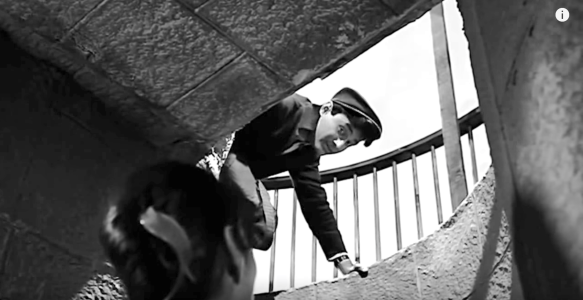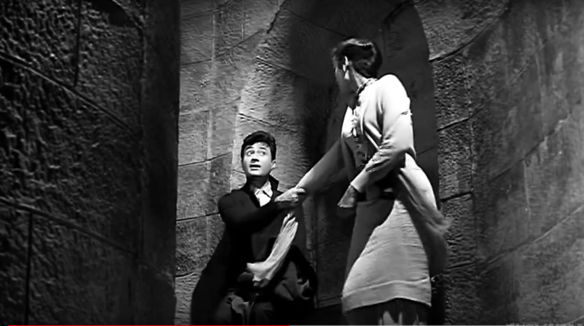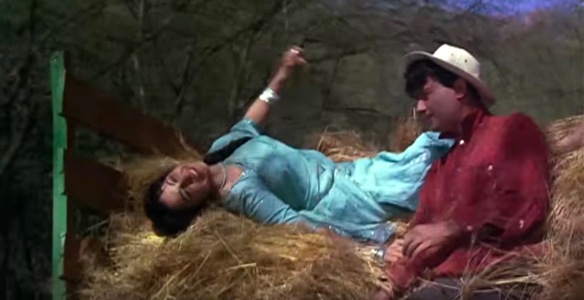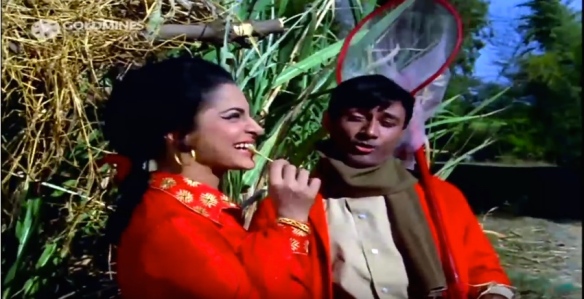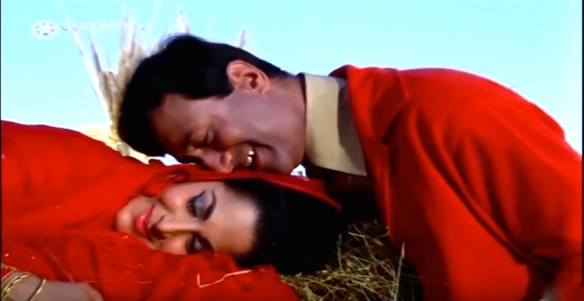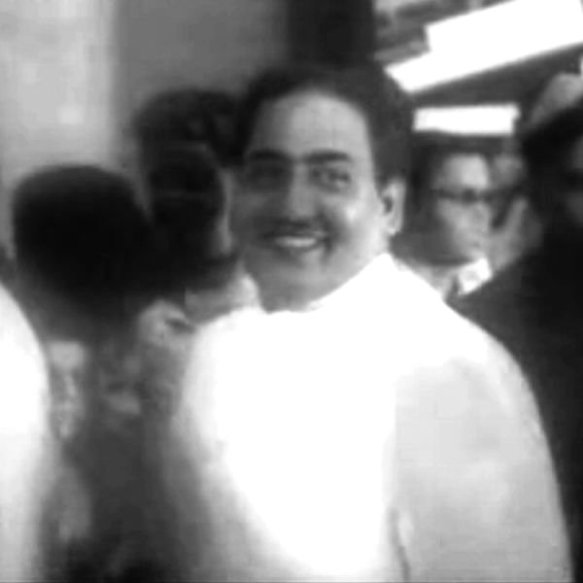
Dev Anand, wearing a deer stalker hat for unclear reasons, hugs Vijantimala during “Aasman Ke Neeche” from Jewel Thief (1967).
Today we showcase the lyrics and English translation to the playful duet “Aasman Ke Neeche” from hit thriller Jewel Thief (1967).
Let me start by saying that Jewel Thief is an incredible film. If I’m being honest amongst friends, not every masala film from the Golden Age stood the test of time. Vijay Anand’s Hitchcockian thriller Jewel Thief makes you its willing hostage by mixing a love triangle with an international crime heist. Throw in Helen posing as a Bond girl in a chicken costume and you have earned my rapt attention on a Friday night. Pun intended, Jewel Thief is a real diamond in the rough.
When “Aasman Ke Neeche” begins, Vijayantimala and Dev Anand relax in a sun-drenched garden on a Spring day. She sings the first few lines of the song and Dev Anand mocks her, twisting her melody into a flat-toned qawwali and calling her song “bogus!” What a dis.
Why do people dump on qawwalis so much? Not only are they often just as complicated classical compositions as any Hindustani purist could muster, but they’re a ton of fun. So, at least for me, Dev Anand’s poor attempt backfires. Even he knows it, because he then proceeds to burst into a full blown orchestral (complete with Kishore’s vocals), shutting down the qawwali debacle.
“Aasman Ke Neeche” ranks among my favorite classic Hindi film duets. It’s melodic and flirtatious, chasing the audience through a garden of poetic overtures, thanks to the dynamism of S.D. Burman and Majrooh Sultanpuri. In a musical masterpiece like Jewel Thief, however, the song can be overshadowed by the film’s other show-stealers (“Raat Akeli Hai,” need I say more?) But in any other film, this duet would be THE song for which you anxiously sat through the entire three hours of melodrama.
We hope you enjoy our English translation to the lyrics of “Aasman Ke Neeche” below! Check out the music video here and let us know your favorite song from Jewel Thief in the comments!
Aasman Ke Neeche Lyrics & English Translation:
Asmaa.N ke niiche, ham aaj apne piichhe
Beneath the sky, today we leave behind us
Pyaar kaa jahaa.N basaa ke chale
A world of love we inhabited as we go
Qadam ke nishaa.N banaa ke chale
We leave our footprints behind as we go
Kishore: Tum chale to phuul jaise aa.Nchal ke rang se saj gayii raahe.N, saj gayii raahe.N
Kishore: You walk and like flowers the colors of your sari decorate the path
Paas aao mai.N pahanaa duu.N chaahat kaa haar yeh khulii khulii baahe.N, khulii khulii baahe.N
Come close to me, and these opens arms will give you a garland of love
Lata: Jiskaa ho aa.Nchal khud hii chaman, kahiye woh kyuu.N haar baahon ke Daale
Lata: The one with the sari is herself a garden, so tell me why would she need a garland from the branches of your arms?
Asmaa.N ke niiche, ham aaj apne piichhe…
Lata: Boltii hai.N aaj aankhe.N kuch bhii na aaj tum kehne do hamko, kehne do hamko
Lata: Today my eyes are speaking, do not let me say anything
Bekhudii baDhatii chalii hai, ab to khaamosh hii rahne do hamko, rahne do hamko
Although my restlessness grows, leave me in silence now
Kishore: Ek baar ek baar mere liye, kah do, khanake laal ho.NTho.N ke pyaale
Kishore: Just once for me, say something and clamor the plates of your red lips
Asmaa.N ke niiche, ham aaj apne piichhe…
Kishore: Saath mere chalke dekho aayii hai.N dhuum se ab kii bahaare.N, ab kii bahaare.N
Kishore: Come with me and see with what an unproar Spring has arrived
Har galii har moD pe woh dono.N ke naam se hum ko pukaare, tum ko pukaare
At every street, at every turn, they call to me, they call to you
Lata: Kah do bahaaro.N se aaye idhar, un tak uThkar ham nahii.N jaanewaale
Lata: Tell the Spring to come here, I am not getting up and going there
Asmaa.N ke niiche, ham aaj apne piichhe
Beneath the sky, today we leave behind us
Pyaar kaa jahaa.N basaa ke chale
A world of love we inhabited as we go
Qadam ke nishaa.N banaa ke chale
We leave our footprints behind as we go
Glossary:
aasmaa.N: sky; niiche: beneath; piichhe: behind; pyaar: love; jahaa.N: world; basaanaa: to inhabit; qadam ke nishaa.N: footprints; phuul: flower; aa.Nchal: drape of a saari; rang: color; sajnaa: to decorate; raah: path; pahanaa: to wear; chaahat: love, desire; haar: garland; baahe.N: arms; khud: self; chaman: garden; Daal: branch; aa.Nkhe.N: eyes; kuch bhii: anything; bekhudii: restlessness*; bhaDaanaa: to grow: khamosh: silence; ek baar: one time; khanaknaa: to clang together, to clamor; pyaalaa: cup, small plates; dhuum: uproar; bahaare.N: Spring; galii: street; moD: turn; naam: name; pukaarnaa: to call out; idhar: this way (as opposed to udhar, that way); uThnaa: to get up
*Bekhudii is a complicated word to explain briefly. See our translation of “Hum Bekhudi Mein,” featuring none other than Dev Anand (in another stellar hat) for a deeper dive!
Fun grammar gem: Bahaar taken alone means Spring (singular) in Urdu-Hindi. However, it is the plural form, bahaare.N, that is frequently heard in Bollywood poetry, which can be taken to literally mean the Spring season or more liberally, as general blossomings. To further confuse the budding literati, the Hindi word baahar, which means, outside, is technically the realm where bahaar, Spring, occurs!
This delightful duet was requested by megafans Shabyanath Roshan, and Srini! We greatly appreciate this burst of Springtime fever in the middle of our cold Boston winter!
– Mrs. 55




